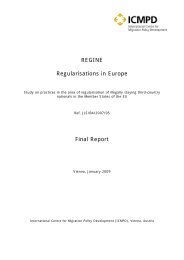European Union Enlargement - An historic opportunity
European Union Enlargement - An historic opportunity
European Union Enlargement - An historic opportunity
You also want an ePaper? Increase the reach of your titles
YUMPU automatically turns print PDFs into web optimized ePapers that Google loves.
NEGOTIATIONS: ANALYTICAL EXAMINATION OF THE ACQUIS (‘SCREENING’)<br />
Starting from spring 1998, the Commission conducted a process of analytical examination<br />
of the acquis with all candidate countries except Turkey. The aim of this exercise<br />
was to help the countries concerned to increase their understanding of the<br />
rules that underpin the EU and identify more clearly which issues they need to<br />
address as they adopt and implement the acquis. For the negotiating countries this<br />
exercise also served to prepare the negotiating process.<br />
In December 1999 the Helsinki <strong>European</strong> Council invited the Commission to prepare<br />
a process of analytical examination of the acquis with Turkey. As of 2000 the structures<br />
under the Association Agreement with Turkey provide for preparing this<br />
process. At Copenhagen in December 2002, the <strong>European</strong> Council concluded that<br />
the process of legislative scrutiny with Turkey would be intensified.<br />
NEGOTIATIONS: THE STATE OF PLAY<br />
Accession negotiations were opened on 31 March 1998 with six countries: the<br />
Czech Republic, Estonia, Hungary, Poland, Slovenia and Cyprus. Subsequently, on 15<br />
February 2000, they were launched with six more countries: Bulgaria, Latvia,<br />
Lithuania, Malta, Romania and the Slovak Republic. Accession negotiations with<br />
Cyprus, the Czech Republic, Estonia, Hungary, Latvia, Lithuania, Malta, Poland,<br />
Slovakia and Slovenia were concluded at Copenhagen on 13 December 2002.<br />
Negotiations with Bulgaria and Romania continue, on the basis of the same principles<br />
that have guided the accession negotiations so far, and whereby each country<br />
is judged on its own merits. All twenty-nine chapters of the acquis and the institutions<br />
chapter have been opened with both countries. As of February 2003, 23 chapters<br />
had been provisionally closed with Bulgaria, and 16 with Romania.<br />
MONITORING AND SAFEGUARDS<br />
The <strong>European</strong> Council has emphasised that progress in negotiations must go hand<br />
in hand with progress in incorporating the acquis into legislation, and actually implementing<br />
and enforcing it. In mid 2000 the Commission launched a process of monitoring<br />
the negotiations. Its purpose is to assess the implementation of the commitments<br />
candidates have made in the negotiations, making it possible to identify any<br />
delays that may have occurred in the adoption and implementation of the acquis by<br />
each candidate, and highlighting problems that exist or may be anticipated.<br />
As proposed by the <strong>European</strong> Commission and confirmed by the Brussels and<br />
Copenhagen <strong>European</strong> Councils, monitoring is to continue after the signature of the<br />
Accession Treaty, up until accession. This serves a double purpose, i.e. to give further<br />
guidance to the acceding states in their efforts to assume the responsibilities of<br />
membership, and to provide the necessary assurance to current Member States.<br />
Continued monitoring is taking place through established channels such as the<br />
structures of the Association Agreements, peer reviews, and questionnaires, whereby<br />
the Commission signals any delays or problems in the fulfilment of commitments<br />
made in the negotiations.<br />
All relevant information resulting from these activities is being pulled together in<br />
monitoring reports presented regularly to the Council. Six months before the envisaged<br />
accession date of 1 May 2004, i.e. in autumn 2003, the Commission will pro-

















